|
|
|
|
|
|
|
Contents
|
Message from the Executive Officer
|
|
Music Therapy Week interview
|
|
MThNZ 50th Anniversary Conference
|
|
Featured Therapist - Pip Algie
|
New Publication: The Handbook of Music Therapy, 2nd Edition
Vacancies - Raukatauri Music Therapy Centre, Bay of Plenty
Acknowledgments
|
|
|
|

|
From the Chair
Welcome to the first edition of MusT for 2024.
|
Gosh the year is flying along. Our new Executive Officer Sarah Cole is settling into her role based out of our new home base in Wellington, in office space that we share with Choirs Aotearoa New Zealand and we thank them for their kind welcome.
|
This month has seen Music Therapy Week being celebrated in fine fashion around the country. We made the decision two years ago to align with Music Therapy Week celebrations internationally, to reflect our international connections and that the work by and through our community is not bound by our borders.
|
We welcome Dr Emily Hunt and Dr Hyunah Cho as the two new Co-editors of our Journal. Our thanks goes out to May Clulee, for both her contribution to the Journal Editor role and for assisting in a handover to our two new Co-editors.
|
Preparations are well underway for our 50 Year Celebration with the Conference Committee doing a lot of heavy lifting to make this a great event. We hope to see you there in September. There is an update for you on this event in this edition of MusT.
|
We hope you enjoy the read.
|
|
|
|
|
|
|
|
From the President
What an exciting year we have embarked on with a new office base in Wellington and Sarah Cole joining us as our new Executive Officer. Please arrange to meet up with Sarah if you are in Wellington city so you can see where we are and introduce yourself to her. As our front person for MThNZ, it is vital that you as a Music Therapist also connect with Sarah online and provide information about your work so the tasks she carries out reflect the depth and range of practice that is happening across Aotearoa.
|
The relationships we continue to establish and nurture with recent connections locally to international Music Therapy Week are set to flow on to our 50th celebrations in September. Allowing interested parties to be part of this event from wherever they are in the world is an exciting development for Music Therapy New Zealand.
|
In the lead up to our significant gathering in Wellington and also the 20th anniversary of the Victoria University New Zealand School of Music Masters in Music Therapy, I want to acknowledge the work of Barbara Lewis who has been very instrumental in pulling this together from an administrative perspective. To those who are members of the various support groups working behind the scenes your efforts are much appreciated too. Until we meet up later this year, go well.
|
|
Whakawhetai ki a koe (my gratitude to you)
|
|
|
|
Message from the Executive Officer
|
Ko Hūrai me Kōtirana te whakapaparanga mai
|
|
Ko Te Raki Paewhenua, Tāmaki Makaurau te whenua tupu
|
|
Kei Pito-one, Te Awakairangi au e noho ana
|
|
He Kaiwhakahaere au i Te Roopu Puoro Whakaora o Aotearoa
|
I am super excited to be working for Music Therapy New Zealand as your new Executive Officer. Thank you to previous Executive Officers Helen and Lisa and to all of you who have been so generous in sharing your expertise, as I learn about the organisation and your work. Thanks to everyone who has been in contact to introduce yourselves and to share your thoughts with me. It is a joy to learn about the Music Therapy community in Aotearoa, your journey past, present and what is looking like a very bright future!
|
It has been a busy time here on the operations front, with the end of financial year, annual membership renewals, Music Therapy Week celebrations, applications for funding coming in and of course planning for conference in September. The AGM will be held during conference and as it is an election year, I invite you to consider how you would like to be represented and the strategic direction of Music Therapy New Zealand. Organisations are enriched by diverse skillsets, knowledge and lived-experience, so please do consider bringing yours to the table. A notice for AGM and dates for nominations will be circulated soon, along with conference registration details, so keep an eye on the website.
|
|
|
|
|
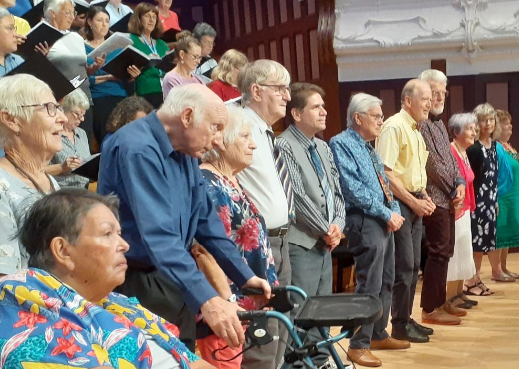
|
|
Music Therapy Week interview
Accessing the Benefits of Music Therapy
written by Ina Rapizo, Arts Access Aotearoa
|
Raising awareness about music therapy and providing greater access to its benefits is a key focus of Music Therapy Week 2024, running from 10 to 15 April throughout New Zealand. The theme of Music Therapy Week 2024 is "Looking Back Moving Forward”, which reflects the timeline and history of the profession and acknowledges the people working towards the growth of music therapy in New Zealand.
|
Enabling greater access to music therapy in New Zealand is important, says Auckland registered music therapist Alison Talmage. Although New Zealand’s population is low compared to many other countries, it is spread out. “Many people living in rural areas can’t access services that are common in more densely populated cities,” Alison says. “We want to have registered music therapists available everywhere and remove financial and geographical barriers to our services.”
|
Music therapy takes a flexible approach that fosters healing and personal growth for its participants, Alison says. It serves diverse communities and meets a range of different emotional, intellectual, physical and social needs.
|
|
Music is an engaging medium for most people of all ages and backgrounds, and participants of music therapy don't need previous musical training or experience.
|
"Registered music therapists utilise a planned and intentional use of music to work towards the hopes, expectations and preferences of participants," Alison explains.
|
Currently undertaking her PhD at the University of Auckland, Alison says the focus of her thesis is on singing groups – or "neurological choirs" – for people with neurological conditions such as stroke, Parkinson's and dementia. The main result of her PhD will be a handbook to guide her practice and support other choir leaders in using music therapy.
|
Alison co-founded the CeleBRation Choir in 2009 at the University of Auckland's Centre for Brain Research and then founded Sing Up Rodney in 2017 in Orewa. She has also worked with a diverse range of individuals in different settings such as schools, a music therapy centre and in private practice.
|
"The CeleBRation Choir sings regularly in rest homes and retirement villages,” she says. “Various participants help with things like managing the sign-in sheet, editing audio recordings and befriending new members."
|
|
Both rewarding and challenging
|
Music therapy is both a deeply rewarding and challenging line of work. "The rewarding parts are the smiles on participants’ faces and supporting them to participate and work at things they find difficult,” Alison says. “But limited public awareness and lack of funding remain constant challenges. Funding for people with disabilities or high health needs is precarious. For people ‘not in the know’ music therapy can seem like a frill rather than a valuable, evidence-based form of support.”
|
Fortunately, Alison says, the CeleBRation Choir is funded by philanthropic funding at the Centre for Brain Research. And she recently received a Music Therapy New Zealand grant to re-start the Sing Up Rodney group in Warkworth.
|
|
Raukatauri Music Therapy Centre
|
Also based in Auckland, Raukatauri Music Therapy Centre was founded in 2004 by singer/songwriter Dame Hinewehi Mohi and is celebrating its twentieth anniversary this year. It now has centres and satellite locations in Northland, Bay of Plenty and the Hawke’s Bay, and works with approximately one thousand clients each week. Watch Sunday Healing lives through music | Sunday Investigates | TVNZ+
|
In addition, Raukatauri’s Hawke’s Bay and Auckland centres facilitate prison-based outreach programmes, funded over 2023 to 2025 through the Creative Arts and Cultural Wellbeing Prison Initiative. This is a $3 million fund provided by Manatū Taonga in partnership with the Department of Corrections.
|
Registered music therapist Ella Polczyk is working with men in Hawkes Bay Regional Prison. She says the positive changes in the mood and wellbeing of the men participating in her sessions are significant. "Whatever they do together during their sessions, which are mostly one-to-one, the goal is the same – to use their inborn responsiveness to music to help them grow and heal," she says.
|
|
Fostering a supportive environment for people of all backgrounds
|
Alison Talmage says that music therapy is an inclusive practice that fosters a supportive environment for people of all backgrounds. It also brings people together as participants often attend music therapy sessions with their partner, family members or friends. This provides meaningful shared experiences at times when other daily activities may have become difficult.
|
"We’re always mindful of social and cultural needs such as bringing whānau to choir, sharing morning or afternoon tea, enabling singers to have a say in the repertoire, and ensuring we have permission to sing cultural songs," Alison says.
|
There is a general awareness that music is good for us emotionally, mentally and socially, Alison says, and music therapy raises specific awareness of why this is. "As registered music therapists, our training teaches us to use all the elements of music to foster engagement, relationships and goal-oriented activities that align with participants' values.
|
“Music is enjoyable and connects us with our feelings, our bodies, our inner self and other people. Rather than using a single area of the brain, music connects many regions of the brain and connects our brains and bodies. It helps us move, use our voices, and manage our emotions and wellbeing.”
|
Music therapy is a small but steadily growing profession that deserves more recognition and awareness, Alison says. “Our vision is for music therapy to be accessible and affordable for everyone who might benefit, while also receiving greater recognition for our skilled work.”
|
|
Article reprinted with permission from Arts Access Aotearoa. For more information about this organisation, visit its website: www.artsaccess.org.nz
|
|
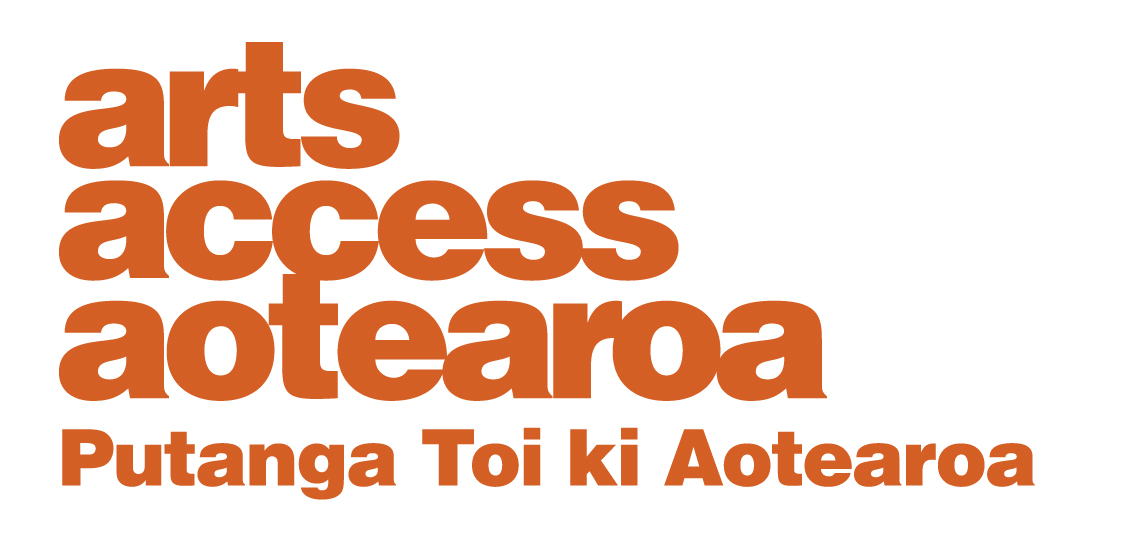
|
|
|
|
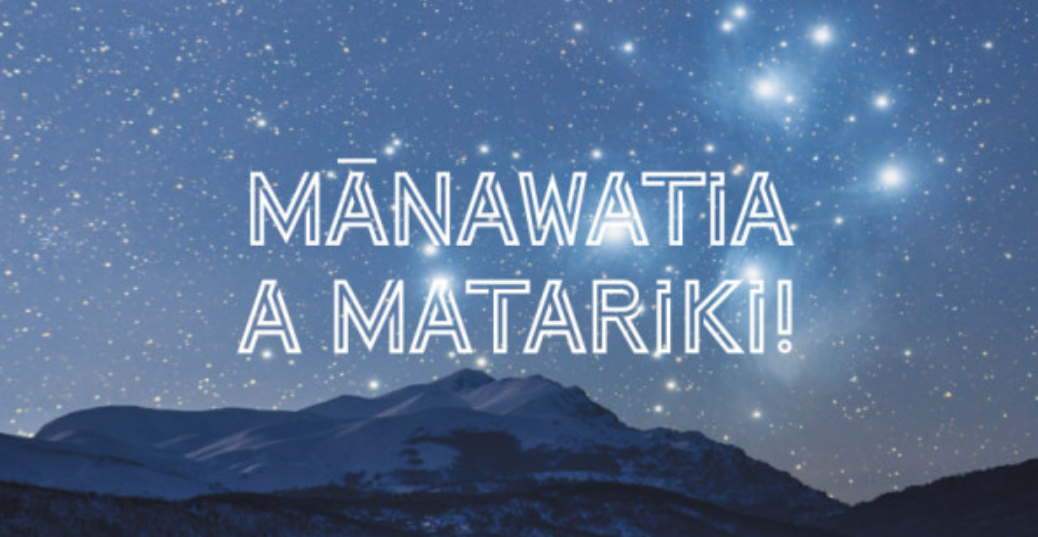
|
Matariki 2024
|
In 2024, we celebrate Matariki from 29 June to 6 July, with a national public holiday on 28 June. Music Therapy New Zealand invites everyone in our community to share their plans for events, workshops and celebrations for Matariki by posting them online to our facebook page and emailing info@musictherapy.org.nz by 31 May.
|
|
|
|

|
|
MThNZ 50th Anniversary Conference
Looking Back Moving Forward
13th, 14th, 15th September 2024
|
Save the date and come to Wellington to celebrate fifty years of music therapy in Aotearoa/New Zealand. The Anniversary Celebration begins the weekend in the Hunter Council Chamber at VUW to celebrate this milestone and also 20 years of the Master of Music Therapy programme. MThNZ's two-day conference is on Saturday and Sunday at Wharewaka Function Centre, on the Wellington waterfront.
|
This will be a hybrid conference. The programme includes over 50 presenters with international and local speakers participating either in-person or online. This will be an event to remember and a wonderful opportunity to promote music therapy, so we hope to see as many people there as possible.
|
|
Programme details will be published and early-bird registrations open in May. Keep an eye on our website for details. Save the date in your calendar so you don't miss early bird rates.
|
|
|
|
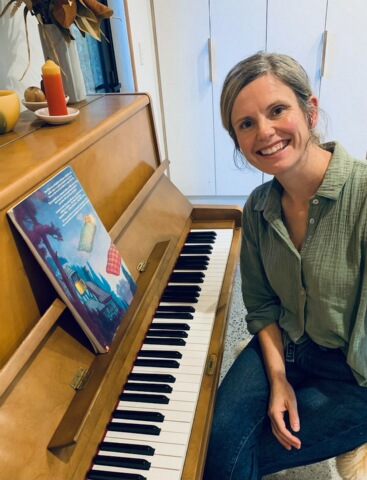
|
Featured Music Therapist - Pip Algie
Pip Algie has been practising music therapy for over a decade in the Wellington region. She currently resides in South Wairarapa with her partner and two young children and balances motherhood with part-time private practice. She is also a member of the MuThNZ Council.
|
Kia ora! Ko Pip ahau. I’m a registered music therapist working in Te Whanganui a Tara. I have been Jamie’s music therapist for a number of years now. Jamie is on the autism spectrum, and his goals in therapy are centred around communication and social skills, and celebrating his incredible talent at the piano. When Jamie sits on that piano stool each week, it’s like he is home! I’m grateful that Jamie’s koro Witi has written a few words to share about the impact music therapy has on Jamie.
|
The impact of music therapy on my mokopuna James
"Music therapy appeals to Jamie’s oranga wairua. He feels it through his oranga tinana. It is expressed through his oranga ngakau and is a way for him to centre himself in his hauora. He’s a boy who is harikoa in character: he becomes he taiohi katakata, menemene, mauritau, matakuikui me hāneanea".
|
|
"Music therapy appeals to Jamie's spiritual life. He feels it through his physical health.
|
It is expressed through his mental health and is a way for him to center himself in his health. He's a boy who is happy in character: he becomes a funny, smiling, confident, fearless and happy teenager".
|
|
Witi Ihimaera (NZ Author)
|
|
|

|
|
|
|
New publication
The Handbook of Music Therapy, 2nd Edition
The thoroughly updated 2nd Edition of Routledge's 'The Handbook of Music Therapy' is edited and co-authored by Professor Leslie Bunt (Emeritus Professor University of the West of England), Associate Professor Sarah Hoskyns (Programme Director for the Master of Music Therapy at Te Kōkī New Zealand School of Music) and Associate Professor Sangeeta Swamy (California Institute of Integral Studies).
|
The new edition embraces theoretical and socio-cultural developments worldwide and takes readers on a journey through the historical and contemporary landscape of music therapy. Woven through the book are the wise voices of international music therapy Elders, three amazing women Professors, Denise Grocke, Cheryl Dileo, and the late - and sadly missed - Carolyn Kenny.
|
The book is enlivened by the stories of varied participants, illustrations from Dr Jonathan Barnes and Cherry Tewfik, new audio and video resources in chapter 13, and the thoroughly updated practice chapter contributions of esteemed colleagues and collaborators.
|
|
The book is available direct from Routledge, or other usual outlets.
|
|

|
|
|
|
Vacancies
Opportunity at Raukatauri Music Therapy Centre
The Raukatauri Music Therapy Trust is excited to announce an upcoming opportunity to work with our vibrant team of music therapists. The position is based in Papamoa and surrounds, in the Bay of Plenty. Please share widely with your networks, including overseas applicants. Applicants are welcome to contact us for a Job Description and to ask any questions about the position prior to applying.
|
If you would like to become part of an organisation that really does make a difference, please email your CV and a covering letter to Rachel Farrell, General Manager – rachelfarrell@rmtc.org.nz.
|
Applications close Friday 3 May 2024
|
|
|
|

|
|
|
Acknowledgments
|
|
MusT is a publication of Music Therapy New Zealand.
|
|
Editor: Sarah Cole, Executive Officer
|
Contributors: Stephen Guerin, Linda Webb, Barbara Lewis, Ina Rapizo (Arts Access Aotearoa), Pip Algie, Witi Ihimaera
|
|
Music Therapy New Zealand is a registered charity in New Zealand. As a not-for-profit MuThNZ relies on the generous support of donors and members to sustain its activites. A heartfelt thank you to the generous contributions of our friends, affiliates, corporate members and supporters upon which our organisation depends.
|
|
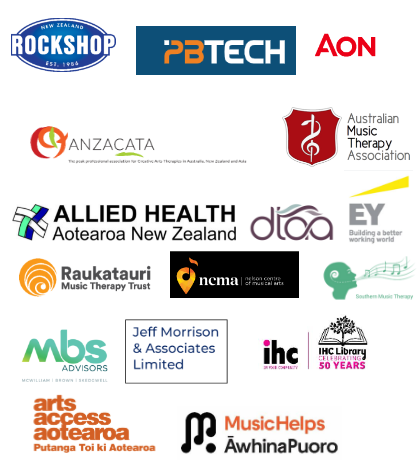
|
|

|
  
|
There are many ways to support and advocate for Music Therapy in NZ
Would you like to advertise here? Please email info@musictherapy.org.nz
|
|
|
|
|
|
|